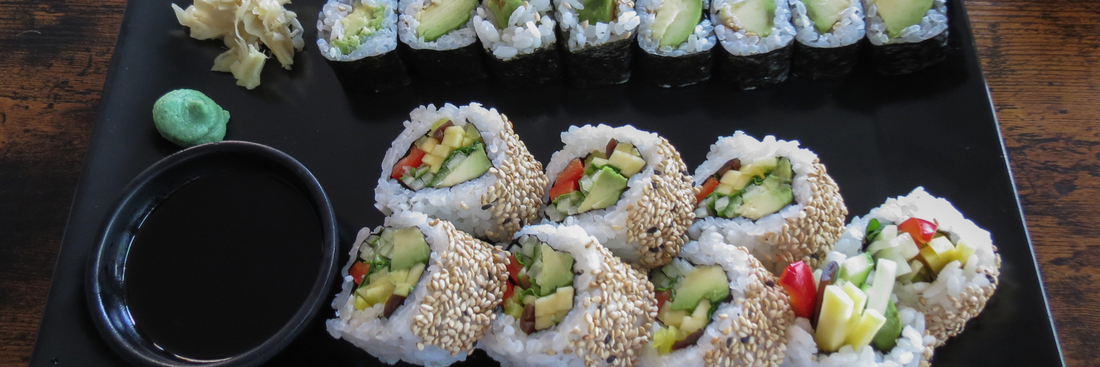Walking into a bustling sushi bar in Toronto or Vancouver, you might notice a new type of order appearing more frequently: vegan sushi rolls. Once considered a niche option, plant-based sushi is rapidly gaining traction, especially among Gen Z consumers. These young, environmentally conscious diners are redefining what it means to enjoy sushi not only valuing taste but also sustainability, health, and aesthetics.
At Kimecopak, we understand that sushi restaurants seeking to serve this new wave of customers need more than delicious recipes they require innovative packaging and sustainable solutions to align with the values of modern diners.
-
Why Do Many Sushi Restaurants Fail After One Year? 5 Common Mistakes
-
Storytelling the “Sushi Master” to Elevate Brand Value
-
5 Tips to Store Ramen Noodles Without Getting Soggy While Waiting
Why Gen Z is Embracing Vegan Sushi

Health Conscious Choices
Gen Z is known for prioritizing health and wellness. According to a 2023 Nielsen survey, 73% of Gen Z adults consider nutrition a key factor in meal choices. Vegan sushi, packed with vegetables, avocado, and plant proteins, aligns perfectly with these preferences, offering a lighter, nutrient-rich alternative to traditional fish-based sushi.
Environmental Awareness
Sustainability drives decision-making for Gen Z more than any other generation. The seafood industry contributes significantly to overfishing and ocean pollution. By choosing vegan sushi, young consumers can enjoy their favorite dishes while reducing environmental impact. Using eco-friendly packaging, such as compostable trays or paper-based sushi wraps from Kimecopak, further reinforces this commitment.
Social Media Influence
Instagrammable meals matter, especially for Gen Z. Vibrant vegan sushi rolls, with colorful vegetables and aesthetically pleasing presentations, naturally perform well on social platforms. Restaurants that highlight these creations, paired with sustainable packaging, often see increased engagement and brand loyalty.
What Makes Vegan Sushi Appealing

Flavor and Creativity
Vegan sushi challenges chefs to experiment. Ingredients like marinated tofu, tempeh, or jackfruit can mimic the umami of fish while introducing unique textures. Flavorful sauces, pickled vegetables, and roasted seeds create depth without animal products.
Variety and Customization
From spicy veggie rolls to sweet mango tempura sushi, the possibilities are endless. Vegan sushi allows restaurants to cater to dietary restrictions while offering endless creativity that encourages repeat visits.
Nutritional Benefits
Beyond taste, vegan sushi can offer fiber, antioxidants, and essential vitamins. Ingredients like avocado provide healthy fats, seaweed offers iodine, and quinoa or brown rice adds protein and energy.
Popular Vegan Sushi Ingredients

Plant-Based Proteins
- Tofu and tempeh
- Edamame and chickpeas
- Plant-based “seafood” alternatives
Fresh Vegetables and Seaweed
- Cucumber, carrot, and bell peppers
- Avocado and sprouts
- Nori sheets and seaweed salads
Specialty Sauces and Toppings
- Miso-based sauces
- Tahini or sesame dressings
- Roasted nuts and seeds
Sustainable Packaging for Vegan Sushi

Why Eco-Friendly Packaging Matters
Gen Z not only seeks plant-based options they also value how their food is presented and packaged. Plastic containers are increasingly frowned upon, whereas compostable, biodegradable, or recyclable options are seen as a reflection of the brand’s commitment to sustainability.
Kimecopak’s Solutions for Sushi Businesses
- Compostable paper trays that keep sushi fresh without harming the environment
- Plant-based PLA lids that prevent spills
- Custom-printed sustainable packaging to enhance brand image
Tips for Choosing the Right Packaging
- Prioritize materials that are certified compostable or recyclable
- Ensure the packaging is leak-proof for sauces
- Highlight eco-friendly messaging to attract conscious consumers
How Restaurants Can Tap Into the Vegan Sushi Trend

Menu Design & Marketing Strategies
- Highlight vegan sushi in a dedicated menu section
- Offer seasonal rolls using local produce
- Include nutritional info and sustainability messages
Engaging Gen Z Customers Online
- Share visually appealing photos on Instagram, TikTok, and Facebook
- Use hashtags related to veganism, sustainability, and sushi trends
- Encourage user-generated content through challenges or giveaways
Collaboration with Eco-Friendly Brands
Partnering with companies like Kimecopak ensures your brand aligns with environmental values, appealing directly to eco-conscious consumers.
FAQs About Vegan Sushi
Is vegan sushi as nutritious as traditional sushi?
Yes. Vegan sushi can be high in protein, fiber, vitamins, and healthy fats while avoiding cholesterol and reducing saturated fats.
Can vegan sushi appeal to non-vegan customers?
Absolutely. Creative flavors, textures, and presentation make vegan sushi attractive to anyone, not just vegans.
How can restaurants maintain freshness without plastic?
Use high-quality compostable containers, insulated trays for delivery, and sustainable lids that prevent leaks while maintaining freshness.
-
LEARN MORE about How "Subscribe for a Happy Life" will benefits your business HERE!
-
LEARN MORE about Kim Vu, sharing on the challenges she faced as a former restaurant owner, and how she overcame them to create KimEcopak HERE!




